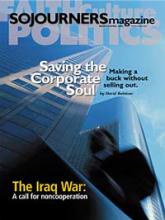Come to the Table
Invite your friends, pass the cookies, and dig into Sojourners. Table Talk discussion guides provide a gathering place for communities to discuss issues of faith, politics, and culturelocal and global. Table Talk offers a smorgasbord of questions (enough for four sessions, if you want to arrange it that way), as well as resources for further study and action. You bring dessert.
Download in Word or PDF format (requires Acrobat Reader) for copy-ready versions with fewer pages, or click "print this article" button on right.
Session I. Community Spirit
"Saving the Corporate Soul" (p. 20)
"Exorcise That!" (p. 10)
Is your workplace in tune with your values? David Batstone describes how corporations often value profit over their workers' well-being and the interests of other stakeholders. Meanwhile, a group of ministers in Portland is concerned with another kind of large organizationthe executive branch of the U.S. government. Inspired by theologian Walter Wink, the ministers see the government's rush to war with Iraq as a spiritual issue.
Questions to Consider
1. What are some of the most important ways in which your workplace and the government do, and do not, reflect your values?
Read the Full Article
